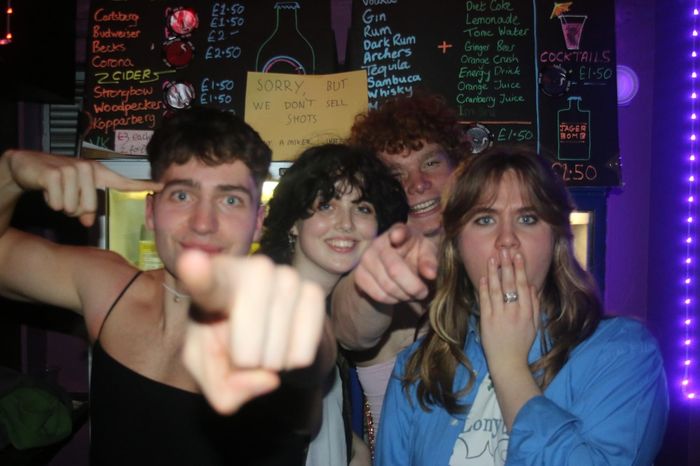Challenging tradition and dressing down in Cambridge
To gown or not to gown? Jess Gotterson speaks to students and staff about the formalities of Cambridge

In the heart of Cambridge, we are thoroughly immersed in its unique institutional traditions on a daily basis. We sip champagne with our Director of Studies before three-course formal dinners, dress in black tie for various events and wander through what feels like Hogwarts in our gowns – these are such a privilege, but we may be oblivious to those who choose to forgo such formalities and boycott these traditions. Are the shifting expectations surrounding participation in these traditions a positive nod to the progressive future of Cambridge? Or does it risk the dilution of the authentic Cambridge magic?
“Any time expended on the social events of my college is a diversion from that dominant focus”
To find out, I spoke to Professor Matthew Kramer, a fellow of Churchill College since 1994. He shared that throughout his three decades at Cambridge, he has attended “no Feasts and very few formal dinners”. Whilst Professor Kramer does not, by any means, object to others participating in these traditions, he regards them as a waste of his time. “My life is centred on my scholarly work,” he explained. “Any time expended on the social events of my college is a diversion from that dominant focus”. With 24 published books in the last 33 years, it’s clear that his dedication to scholarly research is stronger than his desire to attend the formal dinners. He posed the question, “Would I have been able to sustain that level of scholarly productivity if I had been swanning off intermittently to participate in black-tie events? I think not.” This interesting perspective did leave me wondering whether we should jeopardise the academic work we are here to do to adhere to the traditional obligations of the university. Are we here to excel academically or to socialise?
I also wondered whether the traditional dining culture might deter potential students from applying to Cambridge due to the intimidating nature of the formal dining and dressing, which could overshadow its academic allure. I spoke to Dr Chris Scott, the Tutor for Admissions and Outreach at Gonville & Caius College, about the significance of these formal dinners and the Minimum Dining Requirement for Caius students. Scott regards the MDR as “a great way of meeting new people in different year groups and different subjects”, something he found more difficult in his experience as an undergraduate at a different college without this system. The diversified opportunities to use the MDR at Caius means there is no pressure to spend hours at a formal dinner, but there is always a meal cooked for you to choose from for brunch, lunch or a quick cafeteria dinner where the social setting can help to foster new connections. Some students even suggested to me that they would go without dinner to avoid time ‘wasted’ on food shopping and cooking, emphasising the necessity of the minimum dining requirement, which Dr Chris Scott believes is a really good idea to encourage students to socialise and leave the library, and to spread the idea that eating dinner does not have to mean you are jeopardising your work.
“It can feel as if we all exist in our own little bubble here at Cambridge, slightly out of touch with reality”
It is also “incredibly important to consider that for some, the heavy traditions can be off-putting, but this doesn’t mean tradition must be wiped out”. It is clearly, as Chris notes, “a really hard balance to strike” because the admissions and outreach team at Caius often avoid excessive social media posts of people in their formalwear in case it appears off-putting or overwhelming, yet the undergraduate matriculation video was one of the most popular posts. Overall, it seems to me that the formalwear and formal dinners here at Cambridge are one uniquely traditional aspect of university life that we can choose to participate in to experience the wider social life of our colleges, but that no one should be too worried about culinary etiquette or appropriate formal dress. I also spoke to Jeanne Petrel, a French exchange student here for one year in Cambridge, to hear an “outsider’s perspective” on our quintessentially English educational institution. Whilst she regards it a “privilege” to be part of such a prestigious institution that keeps old traditions alive, there are downsides to acknowledge. It can feel as if we all exist in our own little bubble here at Cambridge, slightly out of touch with reality, which could then cause difficulties in transitioning from here to the real world in which these older, possibly elitist traditions seem out of place. Jeanne discussed how her friend, on an exchange year in Oxford, did not wish to pursue a PhD there because when she left Oxford to reconnect with her family, she felt she had lost “a true sense of the real world”.
It is true that a university so commonly associated with Hogwarts might take on that role as an imaginary, fantastical world. Jeanne is also currently working on an article surrounding the ‘politics’ of personalisation regarding our academic gowns within the Cambridge world of uniformity. Although she enjoys wearing the gown and feeling part of the college and wider Cambridge community, she suggested that by personalising our gowns, “students can rebel against tradition in a weak, subtle sense” because otherwise, these identical gowns can erase individuality. When the formal wear dress code can be so overwhelming, reclaiming your identity in your gown and allowing it to reflect your values and your culture could create a more welcoming and less intimidating environment here at Cambridge.
So, overall, it seems that continuing to challenge and question tradition at Cambridge can be an effective way to hold the institution to account. We can ensure it continues to progress and improve for both current and prospective students as we navigate the balance between tradition and modernity. However, I’ve found that there is no extreme pressure surrounding the involvement in these traditions and no expectations that should be off-putting and intimidating: the choice is ours to prioritise work, socialising, or strike a harmonious balance between the two. We have a magical opportunity to experience and embrace something that only Cambridge students can if we so wish to do so.
 News / Colleges charge different rents for the same Castle Street accommodation2 March 2026
News / Colleges charge different rents for the same Castle Street accommodation2 March 2026 News / King’s hosts open iftar for Ramadan3 March 2026
News / King’s hosts open iftar for Ramadan3 March 2026 Theatre / Lunatics and leisure centres 4 March 2026
Theatre / Lunatics and leisure centres 4 March 2026 News / Angela Merkel among Cambridge honorary degree nominees27 February 2026
News / Angela Merkel among Cambridge honorary degree nominees27 February 2026 News / News in Brief: waterworks, wine woes, and workplace wins 1 March 2026
News / News in Brief: waterworks, wine woes, and workplace wins 1 March 2026








